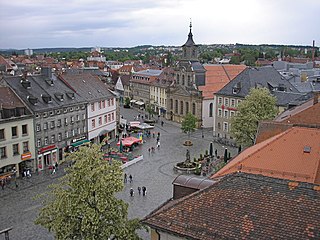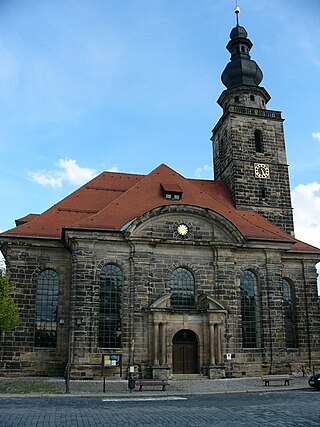Sophienkirche was a church in Dresden, Germany.
Sophienkirche may also refer to:

Bayreuth is a town in northern Bavaria, Germany, on the Red Main river in a valley between the Franconian Jura and the Fichtel Mountains. The town's roots date back to 1194. In the 21st century, it is the capital of Upper Franconia and has a population of 72,148 (2015). It hosts the annual Bayreuth Festival, at which performances of operas by the 19th-century German composer Richard Wagner are presented.
Brandenburg is one of Germany's sixteen Bundesländer.
A Festspielhaus or Festival Theatre is a German language term describing a theatre designed for opera or music festivals.
Tabor may refer to:
Saint Sophia Cathedral may refer to:
Sankt Georgen may refer to several places, all named after the German name of Saint George:
Hofkirche is the German language word for "court church", and may refer to:

Carl Philipp Christian von Gontard was a German architect who worked primarily in Berlin, Potsdam, and Bayreuth in the style of late Baroque Classicism. Next to Knobelsdorff, he was considered the most important architect of the era of Frederick the Great of Prussia.

The Sophienkirche was a church in Dresden.

George William of Brandenburg-Bayreuth was a member of the House of Hohenzollern and Margrave of Brandenburg-Bayreuth.

Monbijou Park is a park in Mitte, a district of Berlin, Germany. The park is bounded to the south by the river Spree, to the west by Monbijoustraße, and to the north Oranienburger Straße and Monbijouplatz. It is close to the Friedrichstadt Palast, Neue Synagogue and the Sophienkirche.

The Sophienkirche is a Protestant church in the Spandauer Vorstadt part of the Berlin-Mitte region of Berlin, eastern Germany. One of its associated cemeteries is the Friedhof II der Sophiengemeinde Berlin.

Mitte is a central section of Berlin, Germany, in the eponymous borough of Mitte. Until 2001, it was itself an autonomous district.
Adler Apotheke or Adler Pharmacy may refer to several pharmacies in Germany:

The Internationale Maifestspiele Wiesbaden is a theater festival in Wiesbaden, Germany. Established in the late 19th century after the Bayreuth Festival, the festival is one of the most distinguished international theatre and music festivals in the world. It is presented annually in May at the Hessisches Staatstheater Wiesbaden, the State Theatre of Hesse in the capital Wiesbaden. The festival currently features performances of operas, ballets, plays and musicals. Visiting companies, mostly from European theaters, present their recent productions along with performances of the Theater Wiesbaden. Concerts from a wide array of music genres are featured as well as artistic circus acts and modern dance presentations. Lectures, recitals, cabaret performances, art showings and readings are also part of the program.
Alexander Ferdinand Grychtolik is a German harpsichordist, improviser, musicologist and academic.
Sofia Church, named for Swedish queen Sophia of Nassau, is in Stockholm, Sweden.

The Ordenskirche St. Georgen or Sophienkirche is a church in the Sankt Georgen suburb of Bayreuth, a suburb which had been founded by George William, Margrave of Brandenburg-Bayreuth as hereditary prince of the Principality of Bayreuth. The church's foundation stone was laid in 1705. Stone was supplied from twenty nearby and distant quarries and in 1709 the church's outer shell was completed. As George William had hoped, the church was consecrated on the feast day of his name-saint George, 23 April 1711, though some work had to be carried out after consecration.
Richard Wagner (1813–1883) was a German Romantic composer.
Johann Friedrich Falckenhagen, also Falkenhagen, was a German organ builder in Berlin.